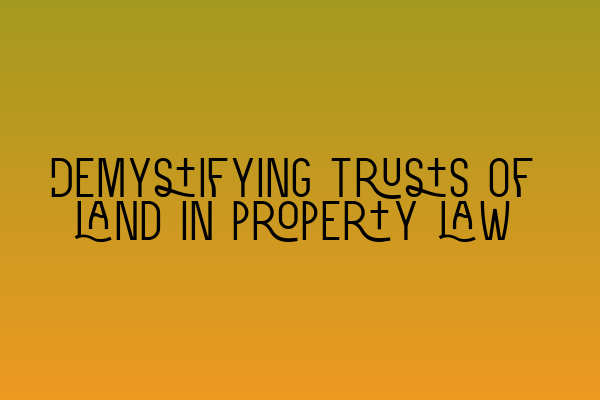Demystifying Trusts of Land in Property Law
Property law can be complex, and one area that often causes confusion is trusts of land. Understanding trusts of land is essential for both property owners and legal professionals in order to navigate the intricacies of property transactions and ownership. In this blog post, we aim to demystify trusts of land in property law, providing you with a clear understanding of their purpose, types, and implications.
What is a Trust of Land?
A trust of land refers to a legal arrangement where a property is held and managed by one party (known as the trustee) on behalf of another party (known as the beneficiary). The beneficiary has an equitable interest in the property, although legal ownership is vested in the trustee. Trusts of land play a significant role in property transactions, allowing for co-ownership, investment opportunities, and ensuring the equitable distribution of property rights.
Types of Trusts of Land
There are various types of trusts of land, each with its own specific characteristics and purposes. Some commonly encountered trusts of land include:
- Bare Trust: In a bare trust, the legal owner (trustee) holds the property for the beneficiary, but the beneficiary has full control and ownership rights over the property. The trustee’s role is merely as a nominal holder of the legal title.
- Joint Tenancy: A joint tenancy is a popular form of co-ownership, where each owner has an equal and undivided share in the property. Upon the death of one owner, their share automatically passes to the surviving owner(s).
- Tenancy in Common: Unlike a joint tenancy, a tenancy in common allows co-owners to have distinct shares in the property. Each owner’s share is separate and can be passed on through inheritance or sale independently.
- Resulting Trust: A resulting trust arises when a party contributes to the purchase of a property but does not hold the legal title. The contributing party is entitled to a share in the property, and the legal owner (trustee) holds the property on their behalf.
Implications of Trusts of Land
Trusts of land have various implications in property law, including:
- Protection of equitable interests: Trusts of land ensure that the beneficial interests of co-owners or contributors are protected, even if their names are not on the legal title.
- Co-ownership agreements: Trusts of land often require the co-owners to enter into formal agreements, detailing their respective rights and responsibilities in relation to the property.
- Disputes and resolutions: Trusts of land can be subject to disputes, such as disagreements over the division of profits or the sale of the property. In such cases, legal professionals play a crucial role in resolving these disputes through negotiation or court proceedings.
- Trusts of land in family law: Trusts of land can have implications in family law matters, such as divorce or inheritance, where determining the beneficial interests in a property is important for equitable distribution.
Seeking Professional Advice
Given the complexities surrounding trusts of land, seeking professional advice is essential when dealing with property matters. Property solicitors specialize in property law and can provide expert guidance on trusts of land, ensuring your interests are protected and transactions are conducted smoothly.
If you are preparing for the SQE 1 or SQE 2 exams, consider checking out our related articles and preparation courses:
- SQE 1 Practice Exam Questions
- SQE 1 Practice Mocks FLK1 FLK2
- SQE 2 Preparation Courses
- SQE 1 Preparation Courses
- SRA SQE Exam Dates
In conclusion, trusts of land are a vital aspect of property law, ensuring equitable distribution of property rights and co-ownership arrangements. It is crucial to have a clear understanding of trusts of land to navigate property transactions and resolve any potential disputes effectively. Seeking professional advice from property solicitors is highly recommended to protect your interests. Good luck with your studies and future endeavors in property law!
